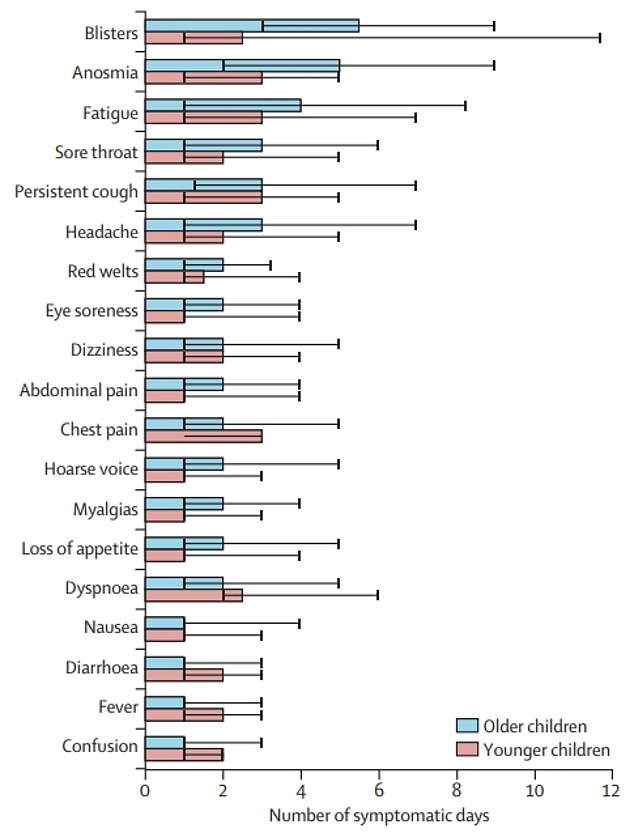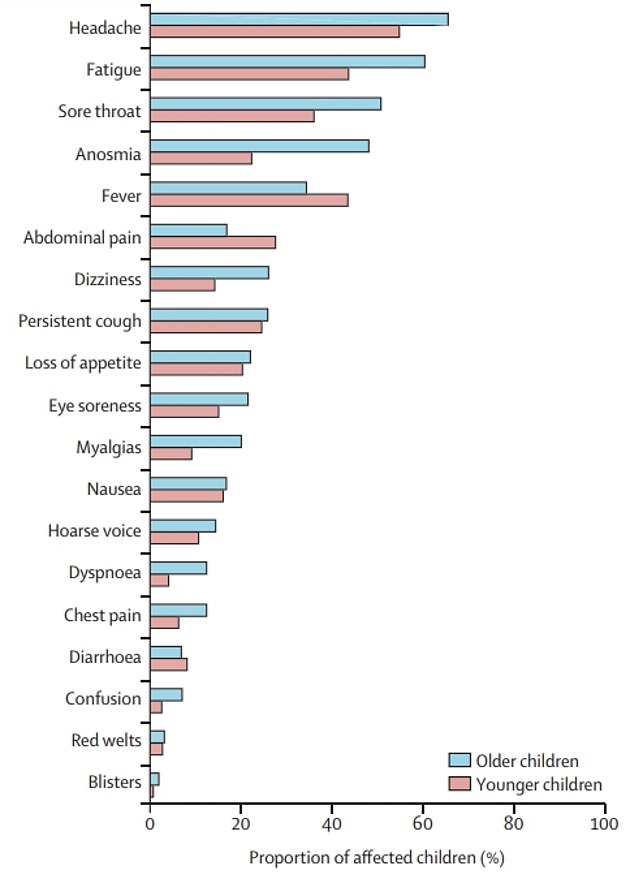Long Covid is rare in children, according to results of a study that researchers hope will reassure parents and teachers.
Fewer than two per cent of children who became ill with the virus suffered persistent symptoms that lasted at least eight weeks. The majority recovered within a week.
But the research only looked at youngsters who were struck down with tell-tale signs of the virus when they were first infected.
King’s College London experts admitted many children who catch Covid ‘don’t show any symptoms at all’.
And studies have shown rates of the poorly-understood condition are lower among those who escape falling ill with Covid initially.
It comes after it was revealed Lewis Hamilton fears he may be suffering the effects of Long Covid, after the F1 driver came close to collapsing at the end of the Hungarian Grand Prix.
The Mercedes racer complained of extreme fatigue and dizziness and required help onto the podium, after finishing third in one of the most dramatic races in recent history.
Experts and MPs criticised No10’s plans to ease lockdown last month by warning the poorly-understood condition could become rife in youngsters.

Long Covid is rare in children, a ‘reassuring’ study by King’s College London has suggested. Graph shows: The average number of days 1,734 children who tested positive for the virus experienced different symptoms in older (12- to 17-year-olds) and younger (12-year-olds and younger) age groups between September 1, 2020, and January 24, 2021

Headaches and fatigue were the most common symptoms in the children testing positive


Emma Duncan (left), professor of clinical endocrinology at King’s College London, describes the results of the study as ‘reassuring’ for parents and teachers. Dr Michael Absoud (right) says the results are relevant to the current dominant Delta variant
Study author Professor Emma Duncan said: ‘It will be reassuring for families to know those children who do fall ill with Covid are unlikely to suffer prolonged effects.
‘However, our research confirms a small number do have a long illness duration with Covid, though these children too usually recover with time.’
WHAT ARE THE LONG-TERM SYMPTOMS OF COVID?
Most coronavirus patients will recover within a fortnight, suffering a fever, cough and losing their sense of smell or taste for several days.
However, evidence is beginning to show that the tell-tale symptoms of the virus can persist for weeks on end in ‘long haulers’ — the term for patients plagued by lasting complications.
Data from the Covid Symptom Study app, by King’s College London and health company Zoe, suggests one in ten people may still have symptoms after three weeks, and some may suffer for months.
Long term symptoms include:
Chronic tirednessBreathlessness Raised heart rateDelusionsStrokesInsomniaLoss of taste/smellKidney disease Mobility issuesHeadachesMuscle painsFevers
For those with more severe disease, Italian researchers who tracked 143 people who had been hospitalised with the disease found almost 90 per cent still had symptoms including fatigue two months after first falling unwell.
The most common complaints were fatigue, a shortness of breath and joint pain – all of which were reported during their battle with the illness.
Source: NHS
Advertisement
Just 25 of the 1,734 children studied — 0.01 per cent — suffered symptoms for longer than a year.
Most infected youngsters fought off the illness within a week. Headache and fatigue were the most common symptoms.
Academics — who used the ZOE symptom-tracking app to monitor symptoms — also assessed children who tested negative for Covid but who may have had a cold.
They found those who were ill with Covid were ill for six days on average, compared with three days for other illnesses.
However, at four weeks the small number of children with other illnesses tended to have more symptoms than those who had coronavirus.
Professor Duncan said: ‘We hope our results will be useful for doctors, parents, and schools caring for these children — and, of course, affected children themselves.’
Fellow researcher Dr Michael Absoud said: ‘Our data highlight other illnesses, such as colds and flu, can also have prolonged symptoms in children.
‘It is important to consider this when planning for paediatric health services during the pandemic and beyond.
‘This will be particularly important given the prevalence of these illnesses is likely to increase as physical distancing measures implemented to prevent the spread of Covid are relaxed.’
Scientists said it was reassuring that there were no reports of serious neurological symptoms such as fits or seizures, impaired concentration or anxiety.
The study was carried out between September 2020 and February 2021, before the Indian variant became dominant in the UK.
But speaking at the same briefing, Dr Absoud added: ‘There is no evidence Delta is more severe in children than Alpha.’
Health minister Lord Bethell said: ‘It’s encouraging to see the condition [long Covid] is uncommon among children.
‘We will continue to provide support to those suffering the long term effects of the virus.
‘Already we have opened over 80 long Covid assessment services across England, including specialist services for children and young people backed by £100million.’
The KCL research, published in the Lancet Child and Adolescent Health journal, was reliant on self-reported data by parents.
They said this may lead to inconsistencies in the data, with some families overlooking minor symptoms.
Separate research by the Office for National Statistics found a higher proportion of infected children went on to have long Covid.
Some 13 per cent of under-11s and about 15 per cent of 12- to 16-year-olds claimed to have symptoms lasting longer than five weeks.
Fears that long Covid is prevalent in children have led to arguments for vaccinating children to protect them against enduring illness.
The Joint Commission for Vaccination and Immunisation last month recommended children age 12 and more should be allowed a Pfizer vaccine if they are at increased risk of sever disease or live with someone who is.
And MPs previously suggested long Covid in children should stop ministers from relaxing Covid restrictions both in schools and in wider society.
Speaking before Freedom Day on July 19, chair of the All Party Parliamentary Group for Coronavirus Layla Moran said: ‘Covid is not like the flu.
‘It can cause long-term serious illness in otherwise young and healthy people, including children.
‘Even those who are not hospitalised have a risk of developing this debilitating condition, leaving them needing ongoing support for many months to recover.’
She added: ‘The new Health Secretary must consider the impact of long Covid ahead of lifting restrictions on July 19 to prevent another wave of cases that could have a devastating impact on our health service and economy.
‘Gavin Williamson must also consider the risk posed by long Covid to pupils as part of plans to relax Covid measures in schools.
‘The Government’s current approach risks condemning thousands more people to live with the cruel impact of long Covid while struggling to access the support they need.’
Lewis Hamilton fears he has Long Covid after struggling with dizziness, fatigue and blurred vision after finishing 3rd in Budapest GP
Lewis Hamilton feared he may be suffering the effects of Long Covid, he admitted after coming close to collapse at the end of the Hungarian Grand Prix.
Hamilton complained of extreme fatigue and dizziness and required help onto the podium, after finishing third in one of the most dramatic races in recent history.
Last, after a strategic mistake by Mercedes, Hamilton weaved his way through the field to achieve a podium finish, and go into the mid-season break with a six point lead over his rival Max Verstappen in the drivers’ championship.
But after the race he admitted he may be suffering the debilitating long-term effects of coronavirus, having contracted the disease last December.
Hamilton said: ‘I haven’t spoken to anyone about long Covid but I think it is lingering there.
‘I remember the effects of when I had it and training has been different since then. The level of fatigue that you get is different and it’s a real challenge.

Lewis Hamilton has revealed he is still suffering the effects of Covid-19, eight months on from first testing positive for the virus
‘I’m trying to keep training and preparing as best I can. Who knows what it was today? Maybe dehydration. I don’t know but it was definitely different. I had something similar at Silverstone but this was way worse. I was having real dizziness and everything got a bit blurry on the podium.
‘I have been fighting all year with staying healthy because of what happened at the end of last year but still it’s a battle.’
Mercedes team principal Toto Wolff confirmed Hamilton had been sent to the team doctor at the end of the race as a precaution, after he seemed overwhelmed on the podium.
‘I think you can just relate to it with the heat out there and a race like he had with tons of overtaking,’ Wolff said. ‘That is exhausting. I think he should be alright, but it is better to be safe than sorry.’
There was further racing controversy after the Mercedes of Hamilton’s team-mate Valtteri Bottas crashed into both Red Bull cars at the first bend. Verstappen continued but could only finish tenth, collecting a single point.
‘Again, I was taken out by a Mercedes and that is not what you want,’ Verstappen said. ‘I was missing the whole side of my car and the floor was damaged, too, so it was impossible to drive. It is just disappointing. We have had a lot of freak moments which have cost us a lot of points.’

Hamilton appeared at his post-race press conference after getting treatment from the doctor
Hamilton was frustrated, too, after a controversial Mercedes restart strategy which left him as the sole car on the grid, with every other car recommencing their race from the pit lane.
After Hamilton was forced to pit soon after, it left him in last place.
He called the move ‘crazy’ and said he tried to advise his team otherwise – but Wolff remained adamant the decision was correct.
‘It was a bit lonely for Lewis at the start, but it was 100 per cent the right decision and I stand by it,’ Wolff insisted.
‘In the end, you need to make the call out there and you have to take it on the chin that it was the wrong outcome but the decision was right. I don’t think it was an error, even with hindsight. We could have won it today.’
Meanwhile, Sebastian Vettel, who finished second behind first-time winner Esteban Ocon, was summoned to stewards for wearing a shirt in support of gay rights to the pre-race ceremony.
Hungary has recently passed controversial laws that are considered anti-LGBT and both Vettel and Hamilton have spoken out since arriving in the country.
Vettel wore a rainbow-coloured T-shirt with the words ‘Same Love’ across the chest, and said: ‘It’s because I left my shirt on for the national anthem.
‘I’m happy if they disqualify me. They can do whatever they want to me, I don’t care. I would do it again.’
Advertisement
Source link : https://www.dailymail.co.uk/news/article-9856397/Long-Covid-rare-children-Fewer-2-suffer-fatigue-eight-weeks-study-claims.html











